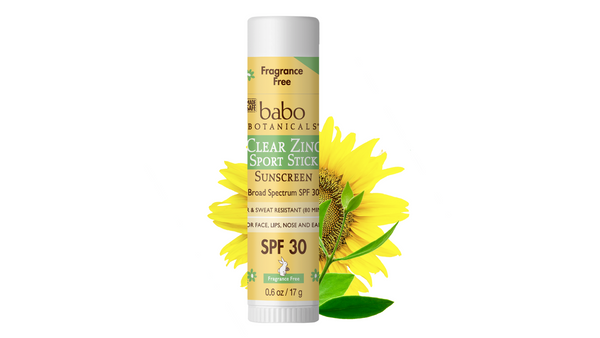
Sport Sunscreen Vs. Regular Sunscreen
Whether you’re an athlete spending long hours training in the sun or you’re simply enjoying long days at the lake and poolside afternoons, sunscreen is a must! And when there’s water or sweat involved, sport sunscreen is the way to go.
Normally, the biggest difference between sport sunscreen and regular sunscreen is that sport sunscreen is water-resistant for a specific time (40 or 80 minutes). So if you’re just going to be lounging on the beach, trying to get a tan, regular sunscreen will suffice. But if you know you’re going to be doing water activities, sport sunscreen is definitely a better option.
In this article, we’ll be going more in-depth about the differences between sport sunscreen and regular sunscreen and the best sport sunscreens you should use.
- What Is Sport Sunscreen?
- What Is The Difference Between Sport Sunscreen And Regular Sunscreen?
- What To Look For In Sport Sunscreen
- 4 Sport Sunscreens You’ll Love
- Sport Sunscreen FAQs
- Sport Sunscreen For Every Body
What Is Sport Sunscreen?
Sport sunscreen offers water-resistant protection to ward off the rays of the sun. In addition to water-resistance, choose a sport sunscreen that provides you with broad-spectrum protection, the appropriate SPF, and is safe for your skin.
Sport sunscreens are typically tested to measure how long they are water resistant before the SPF starts to diminish. Most sports sunblocks are water- and sweat-resistant for around 80 minutes. So you can go on a nice, long run or take a dip in the pool before having to reapply. But you can still get sunburnt when you’re in the water, so wearing sunscreen is equally important whether you’re on the sand or in the ocean.

What Is The Difference Between Sport Sunscreen And Regular Sunscreen?
Typically, the primary difference between sport sunscreen and regular sunscreen is simply that the “sport” option offers more water-resistant protection.
Regular sunscreen is for days you’re out and about and spending time in the sun but not splashing in the water, sweating it out, or soaking up the sun’s rays for hours upon hours.
Meanwhile, sport sunscreen is, in general, water-resistant for up to 40 or 80 minutes. That means it’s not going to wash right off of your skin when you break a sweat or hop in the pool.
So, sport sunscreen comes in clutch for many activities — not just sports — when there’s a chance that water or sweat will wash your sunscreen off. Think pool parties, swimming, relaxing at the beach, hiking, long runs, waterskiing, outdoor workouts… you get the idea.
That said, before you grab the nearest sunscreen and head out the door, let’s go over a few things to look for in sport sunscreen to keep your skin, your body all happy and healthy.

What To Look For In Sport Sunscreen
When shopping for sun sport sunscreens, there are a few key qualities that you should look for to ensure you choose a high-quality, safe sunscreen that provides optimal sun protection.
1. Water-Resistance
If you’re looking specifically for sport sunscreen, it’s probably because you want sun protection while you’re wet or sweaty. That means one of the first things you’ll want to look for when choosing a sunblock is one that is water-resistant.
Check for one that offers you at least 40 or 80 minutes of water-resistance.
2. Broad-Spectrum Protection
If you’ve heard the term “broad-spectrum” thrown around but aren’t sure exactly what it means, we’ve got you covered. The sun shines down on us with three different types of rays: UVA, UVB, and UVC.
The UVC rays don’t make it to the ozone layer, so you can forget about them. What you need protection from are the other two. And broad-spectrum sunscreen blocks both UVA and UVB rays. Perfect!
After all, a sunscreen that stays on for an hour and a half but only protects you from some of the sun’s rays…let’s just say we’re not fans.
3. SPF
SPF is another sunscreen term that you’ve probably heard but may leave you scratching your head. It stands for Sun Protection Factor, but it only tells you how much your sunscreen will protect you from UVB rays, not UVA rays.
Yet, this little number is still important! According to the Skin Cancer Foundation, “The SPF has to do with what percentage of UVB rays make their way through the sunscreen to your skin — the higher the SPF, the lower the percentage of rays that will hit your skin.”
Just keep in mind that even a high SPF doesn’t provide all the sun protection that your skin needs! It’s still important to be careful in the sun by finding shade when you can, wearing protective clothing, and avoiding peak hours (check the UV Index in your area).
4. Skin-Safety
Water-resistance, broad-spectrum protection, and sufficient SPF are all important in keeping your skin protected from sunburn and sun damage. But the key is to choose a sunscreen that offers effective protection but is also safe for your skin and the rest of your body.
Think about it: The sunscreen you lather onto your skin doesn’t just disappear. It can soak into your skin and your bloodstream. This is why a skin-safe sunscreen is essential.
Opt for ingredients that won’t irritate your skin and are safe for the rest of your body when they are absorbed. Chemical sunscreens are made with active ingredients that are, in general, quite questionable.
For example, when oxybenzone (a common chemical sunscreen ingredient) is absorbed into your body, it can cause hormonal disruption.
So, if chemical sunscreen is not the greatest, what’s the other option? Mineral sunscreen.
Read more about the differences between chemical and mineral sunscreen here, but for now, we’ll say this: Zinc oxide is a safe, active ingredient that will protect you from the sun without irritating your skin or messing with your body.
Titanium dioxide is another good option that is often used together with zinc oxide. They make a great couple.
5. For the sake of our environment
The ingredients in your sunscreen matter for your health, but here’s something you might not have thought of — the ingredients in your sunscreen can also affect the environment.
That’s right. When you spend a day snorkeling or basking at the beach, in addition to soaking into your skin, some of your sunscreen may also wash off into the ocean.
And remember oxybenzone, the chemical sunscreen ingredient that can cause issues in your body? Well, when it makes its way into the ocean, it can bleach the corals. Bad news for our sea-dwelling friends..

4 Sport Sunscreens You’ll Love
Swim & Sport Balm SPF50
Made with natural bentonite clay and designed to withstand physical activity, our Swim & Sport Mineral Sunscreen Balm SPF50 is compact and always ready for on-the-go. Water resistant (80 minutes) and made with natural origin zinc oxide, sustainably sourced passion fruit oil and a blend of other plant-based ingredients. The Swim & Sport Balm is a buildable choice for protection, and can be rubbed in for sheer coverage or layered for visible protection on high points of exposure.

Swim & Sport Spray SPF30
A perfect compliment to our Swim & Sport Balm, our Swim & Sport Mineral Sunscreen Spray SPF30 is a convenient non-aerosol pump spray for face and body sun protection.
Also made with natural bentonite clay and designed to withstand physical activity, this lightweight sunscreen Spray is perfect for easy application and re-application, wherever your active lifestyle takes you.

Super Shield Sport Stick
Let Babo Botanicals’ high-performing and convenient Super Shield Sport Stick come to the rescue! This mineral zinc sunscreen provides broad-spectrum, SPF 50 protection, but it doesn’t stop there.

It also moisturizes your skin at the same time with organic shea butter, avocado oil, and jojoba oil. Plus, it’s fragrance-free, making it great for sensitive skin and the little ones in your family, too.
This sport sunscreen comes in stick form with a glide-on application that rubs in easily.
Clear Zinc Sunscreen Stick
Another sunscreen in stick form, Babo Botanicals Clear Zinc Sunscreen Stick is small and great for the face, lips, nose, ears. Count on it to go on clear and rub in well.

This formula is rated a number one in safety on EWG and, like Super Shield Sport Stick, made with skin-safe ingredients and soothing organic oils.
Sheer Mineral Sunscreen Spray
If you prefer sunscreen in spray form, here’s one for you: Babo Botanicals Sheer Mineral Sunscreen Spray. This is an SPF 50 sunscreen that’s safe for the entire family and oh-so-easy to apply!

Simply shake well and apply liberally 15 minutes before you head out into the sun. Just remember not to spray it directly on your or your child’s face. For more info about spray sunscreen and babies, click here.
Sunscreen Lotion
And to wrap up, we’d like to introduce you to two of our lotion sunscreens. Depending on the SPF that your skin needs, choose between Sheer Mineral Sunscreen Lotion with an SPF of 50 and Clear Zinc Sunscreen Lotion with an SPF of 30.

Both contain zinc oxide to protect your skin from the sun and natural ingredients, like our exclusive Nutri-Soothe™ Complex, rich in vitamins and antioxidants to nourish your skin. Win-win.
Sport Sunscreen FAQs
To help you get a better idea of the best sport sunscreens to use, here are the answers to some frequently asked questions.
Which Sunscreen Is Best For Sports People?
The best sunscreen for athletes is sport sunscreen. Sport sunscreen is designed specifically to be water-resistant, so you don’t have to worry about getting sunburnt in the middle of a big game. Whether you’re a runner, soccer player, or swimmer, wearing sunscreen is important any time you’re going to be exposed to the sun for a long period of time. So, it’s crucial to wear a sports sunscreen that will provide excellent protection, like the Babo Botanicals Super Shield Sport Stick Sunscreen.
Is Sport Sunscreen Better?
Sport sunscreen is a better option if you know you’re going to be moving around a lot, swimming, or sweating. Rather than wearing regular sunscreen, which is a better choice if you’re just lounging on the beach, sports sunscreen is water-resistant for up to 40 or 80 minutes. So whether you’re taking a dip in the ocean or going on a run, you can’t go wrong with some sports sunblock.
Can I Use Sport Sunscreen On My Face?
Yes, you can use sport sunscreen on your face. Most sunscreens are formulated with ingredients that are safe for both the body and face, but some people prefer using a separate facial sunscreen that is easier to rub in and better for sensitive skin. Ultimately, it’s a personal preference, but if you’re in a pinch, you’re always better off using the same sunscreen for your face and body than none at all.

Sport Sunscreen For Every Body
The main difference between sport sunscreen and regular sunscreen is that sport sunscreen is specifically formulated to be water-resistant. You can wear it when you’re in the water or out playing sports for up to 40 to 80 minutes without the SPF wearing off.
But sport sunscreen isn’t just for athletes and your super-active friends. It’s also for anyone enjoying time in the sun and getting wet and sweaty while doing so!
Whether you prefer sticks, sprays, or lotions, lather up with Babo Botanicals Super Shield Sport Stick, Sheer Mineral Sunscreen Spray, or Sheer Mineral Sunscreen Lotion. Sun-safe, active adventure begins in three… two…one.






